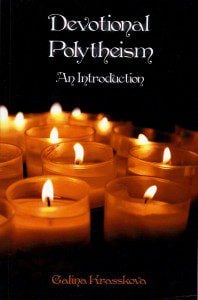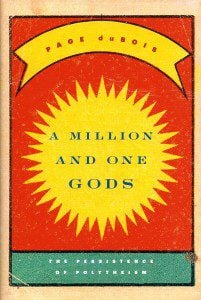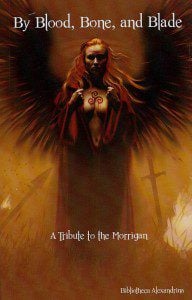Most of my book reviews are full length blog posts. But occasionally I read a book and I just don’t have that much to say about it. That doesn’t mean they’re bad, it just means I don’t have enough to say about any of them to fill a full post.
Here are three books for polytheists. I don’t review books differently based on how I get them, but for those who care about such things, I bought all of these myself – none were review copies.
 Devotional Polytheism – An Introduction
Devotional Polytheism – An Introduction
by Galina Krasskova
published by Sanngetall Press, October 2014
trade paperback: $18.00
210 pages
We live in a culture where monotheism is so dominant its concepts and language are used without question – even by those who have moved on from the Abrahamic religions. Those who feel the call of many Gods may not know where to begin. When asked “where do I start?” I usually say “read Their stories, read Their history, and talk to Their priests.”
If you don’t know any polytheist priests to talk to, reading Devotional Polytheism is the next best thing. In the preface, author Galina Krasskova says “this is the book that I wish somebody had given me in 1991 when I was first starting out as a polytheist and in devotional work.” It starts with a basic explanation of what devotion is and why it’s the foundation of a polytheist practice. It covers basic devotional exercises, altars and shrines, and offerings.
There’s a lot on offerings. Galina says “without offerings, without giving of ourselves and our resources, there is no piety.” She quotes historian Walter Burkert, who articulated the ancient concept “I give in order that you may give.” Reciprocity is at the heart of polytheism. Offerings can take many forms, and Devotional Polytheism discusses many of them.
The second half of the book contains devotional rituals for each day of the week, and for each of the major holidays of the year.
Galina is a Heathen who also participates in other traditions. While there are numerous examples from her Heathenry, this is not a Heathen book. The techniques and practices covered are suitable for any tradition.
The book does an excellent job of providing guidance and direction in establishing a devotional practice. Galina Krasskova has a reputation as someone who states what she believes forcefully, but she makes it clear “there’s no one right way to do devotion, save respectfully.”
Devotional Polytheism has one weakness – it’s twenty years of experience crammed into 200 pages. The book is well-organized and easy to read, but the sheer number of practices and activities can overwhelm a beginner: “do I have to do all that to be a devotional polytheist?” At the end of Part One, Galina addresses this to a certain extent: “you can’t do what I do … you have to do your own work.” Still, I wish it included a guide to getting started.
If someone asked me, I’d say pick one or two things, learn to do them well, then start adding others as you feel ready for them, and as the Gods you honor express Their needs and desires.
But this is a minor complaint. Devotional Polytheism is a book our community has needed for some time.
If you want to learn more about this book, see this full review by Niki Whiting.
 A Million and One Gods – the Persistence of Polytheism
A Million and One Gods – the Persistence of Polytheism
by Page duBois
published by Harvard University Press, June 2014
hardcover: $29.95
208 pages
If you’re a polytheist, A Million and One Gods isn’t a book you need to read, but it’s probably a book you want to read.
A Million and One Gods is a work of religious scholarship. The author says her purpose in writing it “is not to defend polytheism, but to show how difficult it is to discuss it responsibly when it is treated as a curiosity or primitive residue, in the ‘routine,’ the unexamined assumption that monotheism is a superior development out of polytheism.”
Anyone who has actually read the Old Testament knows it is full of polytheism. How could it not be – it was written by and for a group of people living in a culture that was thoroughly polytheistic. The commandment “thou shalt have no other Gods before me” is not the statement of a monotheist.
Polytheism as a concept is only necessary in a monotheistic culture. Without monotheism, people simply worship their Gods. duBois quotes Jordan Paper, who said “Polytheists would have no more reason to call themselves such than they would to call themselves ‘air breathers’ or ‘bipedal’.” And as the subtitle indicates, that worship is persistent.
There are no pure monotheistic religions. Christianity has its Trinity. Father, Son, and Holy Ghost are all found in the Bible, but the doctrine that They are somehow One is not. Islam, perhaps the closest to pure monotheism, still has angels and still has a devil. The strong opposition to idolatry by fundamentalist Muslims simply demonstrates the difficulty (and perhaps, the impossibility) of maintaining a strictly monotheistic practice. If they didn’t continually rant against it, people would naturally venerate ancestors, spirits of place, and other spiritual beings.
duBois does not advocate returning to polytheism. She calls for “cohabitation” among monotheists, polytheists, and non-theists. And she calls for a recognition of our polytheistic heritage. Western culture is the product of Athens as much as it is the product of Jerusalem.
I wish I could put A Million and One Gods on a mandatory reading list for every politician who says the United States is a “Christian nation.”
 By Blood, Bone, and Blade – A Tribute to the Morrigan
By Blood, Bone, and Blade – A Tribute to the Morrigan
edited by Nicole Bonvisuto
published by Bibliotheca Alexandrina, May 2014
trade paperback: $12.99
284 pages
This is a devotional anthology, similar in concept to Hoofprints in the Wildwood, which was dedicated to the various Horned Gods. Blood, Bone, and Blade contains historical essays, literary analysis, rituals, poetry, fiction, artwork, and stories of personal devotion. Several of the contributors are well-known on the Pagan internet: Morpheus Ravenna, P. Sufenas Virius Lupus, Galina Krasskova, David Salisbury, Stephanie Woodfield, and Morgan Daimler. ADF Druid, photographer, and artist Ashley Bryner created the cover. There are many other contributors I don’t know – a total of 45, if I counted correctly.
As with all devotional anthologies, the tone and quality varies widely from piece to piece. That variation seems to be greater in this book than in others like it. Some of that, no doubt, is due to the many different ways the Morrigan presented Herself both in ancient times and today. Some is due to the variation in the experiences the contributors have had of Her. And some is due to the variation in the skills and backgrounds of the 45 individuals who wrote parts of the book.
If you have an interest in the Morrigan, or if you feel called by Her, you will find something to like in this book. You will also find something to disagree with, perhaps strongly.
The first edition of Blood, Bone, and Blade had several printing errors and was taken out of print shortly after its release. The second edition was released at the end of August and is now available on the CreateSpace.com website, but not yet on Amazon.
















